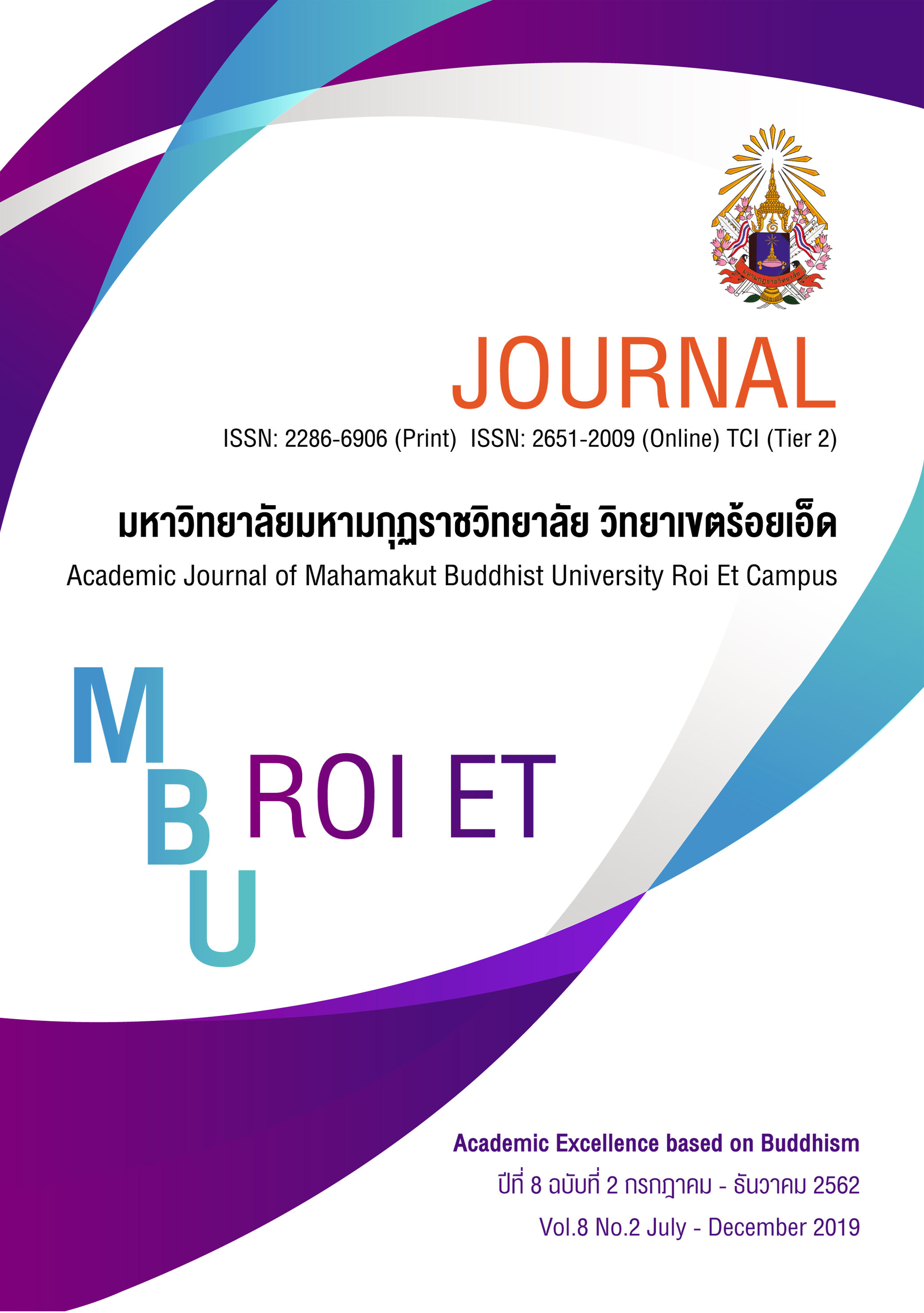An Application of the Four Principles of Gharavasadhamma to the Personnel Management of the local Administration Organizations in Kae Dum District, Maha Sarakham Province
Main Article Content
Abstract
The thematic paper served the purposes: 1) to study the application of Buddhism’s ‘Gharavasadhamma’ (four virtues for a good household life) to managements of, 2) to draw comparisons between personnel’s application of such four virtues and their different gender, ages and educational levels, 3) to collect their suggestions for enhancing their application to managements of their local administration organizations. The sampling groups employed for the research were 214 personnel of local administration organizations, setting the group sizes through Taro Yamane’s table. The research instrument was the five-rating scale questionnaire with each of questions possessing IOC between 1.00 and its reliability at 0.92. The statistics used for data analyses embraced: frequencies, percentages, means, standard deviations, t-tests, and F-tests (One-way ANOVA).
Research findings have found the following outcomes. 1) The application of Buddhism’s four virtues for a good household life to their managements at local administration organizations in the mentioned district have been rated at the high scale in the overall aspect as the same as a single aspect taken into consideration. Of all aspects placed in the descending order of means, they include organizational management, duty management, work management, and task management respectively. 2) The hypothesis testing results have revealed that their application of four virtues for a good household life and different variables are of no significant differences in both aspects. 3) Their suggestions for applying them to enhancing more sufficient managements of their local administration organizations have been recommended in the descending order of first three frequencies. First, personnel have to apply self-adjustment (dama) in a bid to controlling their negative tempers arising out of their duty performance. Next, they have to apply it in an attempt to curb oneself in their duty performance when they are not satisfied with negative consequences. Last, they ought to apply tolerance (khanti) so that they are able to put up with mental disturbance of various types whenever they encounter them.
Article Details
References
เจริญ เจษฏาวัลย์. (2554). การวางมาตรฐานธรรมาภิบาล. กรุงเทพมหานคร : บริษัทพอดีจำกัด.
ประครอง พงษ์ชนะ. (2556). การบริหารงานบุคคลตามหลักฆราวาสธรรมของผู้บริหารสถานศึกษาในเขตพื้นที่อำเภอบ้านฝางสังกัดสำนักงานเขตพื้นที่การศึกษาประถมศึกษาขอนแก่น เขต 1. วิทยานิพนธ์รัฐประศาสนศาสตร์. บัณฑิตวิทยาลัย : มหาวิทยาลัย มหาจุฬาลงกรณราชวิทยาลัย.
พระธรรมปิฎก. (ป.อ.ปยุตฺโต). (2546). พจนานุกรมพุทธศาสตร์ ฉบับประมวลธรรม.
พิมพ์ครั้งที่ 12. กรุงเทพมหานคร : โรงพิมพ์มหาวิทยาลัยมหาจุฬาลงกรณราชวิทยาลัย.
พระธรรมปิฎก. (ป.อ.ปยุตฺโต). (2546). ความสุขของครอบครัวคือสันติสุขของสังคม. พิมพ์ครั้งที่ 4. กรุงเทพมหานคร : มูลนิธิพุทธธรรม.
พระมหาสมบูรณ์ กลฺยาณกิตฺติ (แดงบำรุง). (2558). การนำหลักฆราวาสธรรมไปใช้ในการปฏิบัติงานของบุคลากร องค์การบริหารส่วนตำบลเหนือเมือง อำเภอเมือง จังหวัดร้อยเอ็ด. วารสารมหาวิทยาลัยมหามกุฏราชวิทยาลัย วิทยาเขตร้อยเอ็ด. 4(2). 156-169.
เรด้า จันทร์เหลือง. (2557). การปฏิบัติงานตามหลักฆราวาสธรรม4 ของตำรวจจราจรสถานีตำรวจภูธรเมืองขอนแก่น. วิทยานิพนธ์รัฐประศาสนศาสตร์ สาขารัฐประศาสนศาสตร์.บัณฑิตวิทยาลัย : มหาวิทยาลัยมหาจุฬาลงกรณราชวิทยาลัย.
วิทย์ วิศทเวส. (2542). ธรรมะศึกษาแห่งชาติ พ.ศ. 2542. สืบค้นเมื่อ 12 มิถุนายน 2560. จาก http://www.moe.go.th/moe/th/home/main.php
สำนักงาน ก.พ.ร.. (2547). มาตรฐานทางคุณธรรมและจริยธรรมของข้าราชการและลูกจ้างสำนักงานก.พ.ร.. กรุงเทพมหานคร : สำนักงาน ก.พ.ร..
สำนักงานส่งเสริมการปกครองส่วนท้องถิ่น อำเภอแกดำ. (2560). ข้อมูลท้องถิ่นอำเภอแกดำ. ร้อยเอ็ด : ส่วนท้องถิ่น อำเภอแกดำ จังหวัดมหาสารคาม.


